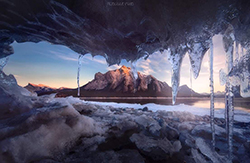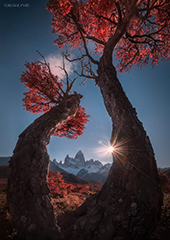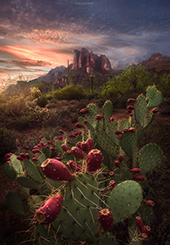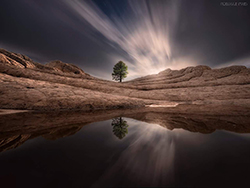
|
|
|||||
|
Featured Photographer, September 2018: Noel Casaje
We are happy to have Noel Casaje as our featured guest photographer this month. We appreciate that he gave us some of his time and generously shared his beautiful photography with us! Please visit his links to see more of his work, and to let him know you enjoyed this interview. :: How did you get started in photography? It was back during high school when my interest for photography ignited. My folks used to own a film store back home. There, I'd always see rolls of unsold and expiring black-and-white film lying around. Instead of seeing them go to waste, I borrowed my dad's camera and just started taking pictures. I was fortunate to have a good friend who had a darkroom. With all these, I learned not only how to take photos, I also discovered how to develop and print my own negatives. :: Were you ever into any other kinds of art or genre of photography? What draws you into nature as a primary subject matter? Even back when I started, I've always had an affinity for the landscape. I've always loved observing the break of dawn and then watching the first light of day wash away the darkness. For me, nothing beats that feeling of solitude, the stillness of everything, those moments of bliss when the light slowly touches the earth. I guess that's it - I feel most at peace and happy when I am exploring small corners of the planet, looking for a new view to photograph. While I enjoy traveling and capturing slices of culture around the world, I feel in-tune with my inner self and most connected to the Creator when I am photographing landscapes. :: What are three interesting things about you that you want people to know? This is fun! I have an embarrassing and irrational fear of heights - something that somehow tempers my love for landscape photography. Though I've mustered enough courage to shoot from the cliff edges like Horseshoe Bend or the Grand Canyon, I've given up hope that I'd be able to photograph from certain, more precarious locations. I'm also a perfectionist to a fault. I am ridiculously meticulous when processing and editing. There is always some detail that needs to be worked on further and I never stop until I feel the image is exactly how I envisioned it to be. It's the reason that a lot of time passes between when a photo is taken and when I post and share it. I let each image percolate and stew for weeks or months! Lastly, I'm a total night owl. I'm most productive deep into the night and work until I pass out during the wee hours. :: You seem to have taken a slightly different approach to market your work. It looks like you’ve chosen to strictly stay with social media platforms as opposed to using a website (I couldn’t even find a website for you). Why is that? To be honest, I've only recently taken a more focused effort to market my work. Before, I just relied on posting my photos on my personal Facebook page to showcase my photography. I did have a 500px site but I haven't updated that in years. I guess I was not sure how my images would be received by a larger audience, and so I deliberately held back my work instead of proactively promoting it. Things started to pick-up when I finally gathered the courage to share my work outside of my personal FB account. I joined different Facebook photography groups and actively posted my images there. The positive feedback encouraged me and that made me realise that I really need to promote my work. My confidence also got a boost when I started growing my Instagram account. By regularly posting my images on that platform, I was able to receive a lot of engagement and met new photographers who inspire me to get better at my craft. For now, I'm finally working on my own website. I hope it will be a venue where I can formally showcase my images. :: Landscape photography is a pretty popular genre now…how do you try to differentiate your work from the rest? Does that come more with processing, or with work in the field finding new compositions? Both! While there is a flood of landscapes and beautiful images on social media each day, it doesn't discourage me from still trying to discover unique compositions. While I can't say that I am successful in finding original compositions in every destination I visit, I still put on a fresh mindset. The world is too huge and there is still tremendous opportunity out there, the important thing is to keep trying to approach things with inspired eyes. Once I have a decided on a spot and composition, the "processing" begins instantaneously and I try to visualise how I would like the final output to be. This informs every decision I make from here on - from the focal length, filter to use and what treatment or approach to take. Processing on the computer flows organically since much of the work has already been done beforehand. It's just a matter of refining the RAW file to achieve the output that I've visualized. I think my style is characterized by bold, impactful images and it also shows that I am willing to take a certain amount of risk in order to get that dramatic mood I crave. It's a fine line that divides an image with plenty of wow factor from one that has too much processing. I try to temper my editing, knowing this is a very subjective matter. I just hope that I have cultivated a photographic style that people can recognize as being uniquely mine. :: It seems that the landscape community is always looking for the next hot spot to go photograph and photographers with larger followings and social media presence are the ones that can start off a trend towards a place. Your work the past two years seems to have hit up all these hot spots, and more…do you feel any need as a photographer to throw your own spin on the popular locations, or do you try to steer clear from them more now? Since doing photography tours has become a core part of my photography business, I have to continue exploring and discovering new destinations for our growing clientele. That said, I always encourage our tour participants to see beyond the typical, popular, obvious compositions even though we are visiting well-regarded, iconic locations. Our participants are always encouraged and assisted to "own" their shots, and that can only be done by investing time in self-exploration and developing one's own style. Iconic compositions are tried and tested but to lean on these, I feel is not good habit, and I couldn't call them my own shots, even if I took the photo because somebody captured it before me. So the challenge - and satisfaction - lies in finding one's own, distinct composition. That satisfaction is heightened when such achievement is made in an iconic landscape destination. :: What is your favorite piece of gear and why? The Platypod. Ok, I have to disclose that I am an ambassador for the brand. Nonetheless, I truly feel this is a piece of gear I can't do without. Some of my best images wouldn't have been possible without this. I mentioned above how important it is to always find unique compositions, and that is only possible if you are able to place your camera in unique and untried positions. The platypod allows me to securely slot my camera through tight gaps and cramped nooks and crannies. A conventional tripod would have made some of these compositions impossible. It doesn't take too much space in my bag so I bring it with me every time. That gives me the confidence of having two tripods whenever I'm out, as well as the ability to make atypical angles possible. :: What is the scariest thing that has happened to you while on a shoot? Not only was it the scariest, it was also my most hilarious and embarrassing experience as well. My group and I were alone in the usually crowded upper terrace of Mammoth Hot Springs in Yellowstone National Park. We had chanced upon a developing storm on the horizon and wanted to see if we could photograph some lightning strikes. Judging from the distance and the direction of the storm, we felt relatively safe. However, in an instant, wind, hail and rain fell upon us and the storm erratically swerved its path. It was now coming straight towards us as a huge lightning bolt struck a hill in front of us. Since our cameras were covered in protective rain shrouds, we still kept on shooting, excitedly anticipating that elusive lightning strike. At one point, I clicked the shutter and saw a strong flash of lightning thru my peripheral vision. I turned around and asked my friends where it hit but they said they didn't see anything. I turned back and locked in my viewfinder again and as soon as I clicked the shutter, another strong lightning lit up sky. It was now truly getting gnarly. I shuddered at the thought of being burnt crisp like bacon - no image is worth that much pain (and life!). I told the group to stop immediately and to hurry back to the car. We made a frenzied dash, keeping a low profile and praying for our dear lives. I gave a big sigh of relief as soon as we made it back inside our vehicle. Checking the images on my camera, I was surprised to see that the pop-up flash was activated. The "lightning" I saw was actually just the camera's flash. We were in fits of laughter after I told everyone what happened. :: What was the most difficult thing for you to learn when you were getting started, and what helped you to improve? Was there articles, other photographers, or anything you referenced to overcome those obstacles? Perhaps the most challenging hurdle for me was developing and fine-tuning my taste especially in post-processing. When I started out, my over-enthusiasm indulged me to apply every editing technique on my images. I would Photoshop my photos and transform them way beyond reality. Looking back, I can't help but cringe at how my early images look. I believe it takes plenty of practice, experience, as well as looking at other photographers work, to fine-tune one's artistic intuition and develop that sense of when to stop. :: What is on your list for the rest of 2018 photographically? Hopefully, to explore a couple of national parks in Montana, Wyoming and Utah. :: It seems with gear improvements, and the growing number of folks entering the profession landscape photography is headed for an unknown future. Should there be cause for concern? Not at all. I am actually more excited. Technology brings about artistic leaps and enables us to pursue more creative, visionary experiments. I do not see the new generation of creatives as a threat. I keep a close eye on them as they also inspire me to try on new directions and novel ideas. As much as I get inspiration from experts and newbies, so too do I hope my contribution to the craft also inspires others. :: What is the one piece of advice you would pass onto someone looking to improve his or her photography skills. In our tours and workshops, I always engage participants by asking them about their photos, to gauge if they feel their images are good enough. I ask them "Does your photo speak to you?" I think we can't expect our images to have an impact on others if they don't speak to us. The photos that we capture, they must impress us first. Composition and post-processing can be technical and complicated if you allow them to be. In my case, I simply let the process flow organically: I use visual cues that evoke strong emotions and feelings within me. When the image speaks clearly to me and I can understand its story or message, then I know the creative process for it is finished. The photo doesn't need to be perfect, I trust my intuition - a gut feel I've developed after years of photographing landscapes - to tell me that I am ready to share this to others. You can find all sorts of perfectly captured photos in the internet but most of these hardly speak any emotion at all. There are also those that are flawed but will still earn a reaction from those that see them. I think there are no hard and fast rules here. One must truly hone that feel, that intuition, if one's work has that "it" factor that'll allow it to leave a lasting impression on those that see it. :: Where do you find inspiration outside of the photography realm? Is there anything else you draw from that you think helps you with photography? To keep myself looking at things with fresh eyes, I try to find inspiration in art beyond photography. I like to watch very cinematic films like Peter Jackson's Lord of the Rings and observe how they use color, lighting and different focal lengths in order to bring out specific moods. Cinema is a great inspiration as it a medium that relies heavily on eliciting emotions from its audience, something that is essence what I strive to do with my photographs. |
Does your photo speak to you?...The photo doesn't need to be perfect, I trust my intuition - a gut feel I've developed after years of photographing landscapes - to tell me that I am ready to share this to others.
Photographer Spotlight Interviews
|
|
 |
Other Cool Stuff→ Past Workshop Photos → 72dpi.com → How-To Articles → Photographer of the Month |
 |
Contact Us→ Contact Us → About Us → Site Map |
© 2009-2024 Aperture Academy, Inc.











